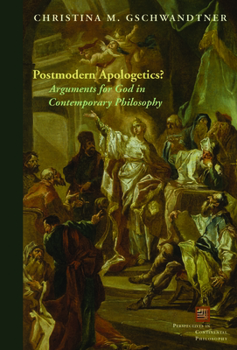Postmodern Apologetics?: Arguments for God in Contemporary Philosophy
(Part of the Perspectives in Continental Philosophy Series)
Select Format
Select Condition 
Book Overview
This book provides an introduction to the emerging field of continental philosophy of religion by treating the thought of its most important representatives, including its appropriations by several thinkers in the United States.
Part I provides context by examining religious aspects of the thought of Martin Heidegger, Emmanuel Levinas, and Jacques Derrida. Christina Gschwandtner contends that, although the work of these thinkers is not apologetic in nature (i.e., it does not provide an argument for religion, whether Christianity or Judaism), it prepares the ground for the more religiously motivated work of more recent thinkers by giving religious language and ideas some legitimacy in philosophical discussions. Part II devotes a chapter to each of the contemporary French thinkers who articulate a phenomenology of religious experience: Paul Ricoeur, Jean-Luc Marion, Michel Henry, Jean-Louis Chr tien, and Jean-Yves Lacoste. In it, the author argues that their respective philosophies can be read as an apologetics of sorts-namely, as arguments for the coherence of thought about God and the viability of religious experience-though each thinker does so in a different fashion and to a different degree. Part III considers the three major thinkers who have popularized and extended this phenomenology in the U.S. context: John D. Caputo, Merold Westphal, and Richard Kearney. The book thus both provides an introduction to important contemporary thinkers, many of whom have not yet received much treatment in English, and also argues that their philosophies can be read as providing an argument for Christian faith.
Part I provides context by examining religious aspects of the thought of Martin Heidegger, Emmanuel Levinas, and Jacques Derrida. Christina Gschwandtner contends that, although the work of these thinkers is not apologetic in nature (i.e., it does not provide an argument for religion, whether Christianity or Judaism), it prepares the ground for the more religiously motivated work of more recent thinkers by giving religious language and ideas some legitimacy in philosophical discussions. Part II devotes a chapter to each of the contemporary French thinkers who articulate a phenomenology of religious experience: Paul Ricoeur, Jean-Luc Marion, Michel Henry, Jean-Louis Chr tien, and Jean-Yves Lacoste. In it, the author argues that their respective philosophies can be read as an apologetics of sorts-namely, as arguments for the coherence of thought about God and the viability of religious experience-though each thinker does so in a different fashion and to a different degree. Part III considers the three major thinkers who have popularized and extended this phenomenology in the U.S. context: John D. Caputo, Merold Westphal, and Richard Kearney. The book thus both provides an introduction to important contemporary thinkers, many of whom have not yet received much treatment in English, and also argues that their philosophies can be read as providing an argument for Christian faith.
Format:Paperback
Language:English
ISBN:0823242757
ISBN13:9780823242757
Release Date:November 2012
Publisher:Fordham University Press
Length:384 Pages
Weight:1.10 lbs.
Dimensions:0.9" x 6.0" x 8.9"
Customer Reviews
0 rating





